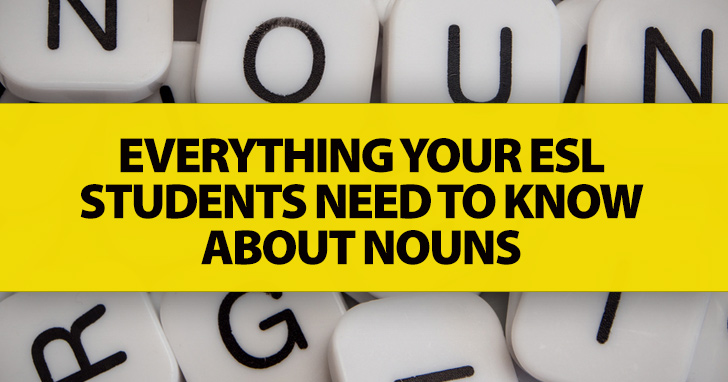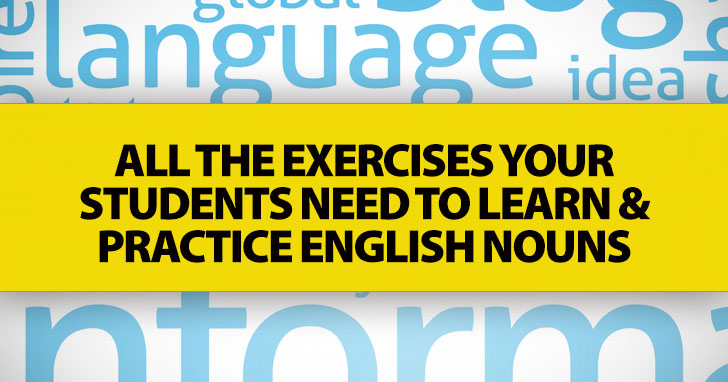Everything Your ESL Students Need to Know about Nouns


If you have read Everything Your Students Need to Know About Nouns, you have already set them a strong foundation for learning the English language.
Nouns, after all, are an essential part of the English language. These exercises are designed to go along with the concepts presented in that article. They will give your students an opportunity to practice using and working with nouns in English.

A simple exercise is all your students need to practice identifying the difference between concrete and abstract nouns. Give students a list of several nouns that include members of both categories. Then, have students work individually to separate the nouns into the two categories: concrete and abstract. Remind your students that concrete nouns are those that a person can see or touch. Abstract nouns are those that identify things a person cannot see, such as emotions and ideas. Once students have sorted their lists, go over each noun with your class, explaining any unfamiliar vocabulary or classification confusion as necessary.
Beginning students might not be ready to read newspaper articles in a reading comprehension activity, but that doesn’t mean you can’t and shouldn’t use the realia in class. After you have explained the difference between common and proper nouns, give your students part or all of a news article which contains both common and proper nouns. Ask your students to find any proper nouns in the piece. They should be able to do this even thought they might not understand what the words themselves because proper nouns are capitalized. Make a list with your class of all the proper nouns they found in the article. Then challenge your students to come up with a common noun that could replace each proper noun. For example, if your article talked about Arnold Schwarzenegger in Los Angeles, you could change those proper nouns to common nouns by referring to a movie star (or former governor or a man) in a large city. If you want to extend the exercise, give your students a list of around ten common nouns and challenge them to come up with a proper noun that could replace each one in a sentence.
If you are teaching strict beginners, you will want to keep this exercise very simple. But if your students are able to understand sentences with a little more complexity, feel free to challenge them with this activity which asks students to identify the roles nouns play in a sentence. In simple terms, nouns can either be the subject of the sentence, the object of a verb, or the object of a preposition. For students just learning English, write a sentence on the board that contains only one or two nouns. Ask your students to identify the noun(s) in the sentence and say what role it is playing – subject, object, or object of the preposition. (Avoid using sentences with indirect objects unless you have already taught your students about them.) For students a little more advanced, write as complicated a sentence as they can manage, tell them how many nouns are in the sentence, and then ask them to identify each noun and its role in the sentence. Review answers and answer any questions your students have.
Practicing singular and plural nouns is really quite simple. A student starts with a singular noun and writes its plural form. Or she might start with the plural form and write the singular form. You can make this activity a little more interesting for your students by turning it into a relay race such as this review exercise. Divide your class into teams of four or five students. Each team will need a cup set at the front of the room. In the cup, you will have a set of tongue depressors or Popsicle sticks, each of which has one singular noun written on it. Each cup should have ten to fifteen sticks in their cup, which include regular and irregular plural nouns, and each team’s words should be the same as those of the other teams. On your go, one person from each team rushes to the front of the room, grabs a stick from their team’s cup (be careful not to knock the whole thing over), and writes the plural form of that noun on the board before running to the back of his team’s line. The next person can either choose a new stick and a new word or make a correction to one of the words already on the board before returning to his team. The teams continue until they have pluralized all the nouns in their cup. The first team to finish scores five points, the second three points, and the third one point. (Feel free to adjust these points depending on how many teams are playing.) Each team also scores one point for every correctly pluralized word on the board once they are finished. Add up the points and declare the winning team.
You can find a great list of collective nouns here. (Note: these collective nouns all refer to people, but you can add your own entries to the list for animals, etc.) Help your students remember which nouns are collective and what they describe by making up a set of playing cards. For each collective noun, write the collective noun on one blank index card and the objects it refers to on another blank index card. Then have your students use these cards to play go fish or memory in which they must match each (singular) collective noun to its (plural) members.
If you are studying noncount nouns in class, you could probably fill the day with exercises. Here you can find five different fun-filled activities, which practice count and noncount nouns.
Nouns really are the building blocks of the English language, and it’s important that your students understand what they are, their roles in a sentence, and how to use them grammatically. Try these exercises with your students and give them the foundation they need on which to build their future English language knowledge.